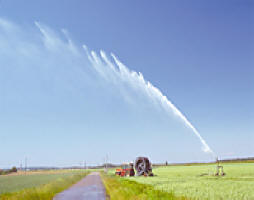 International Training of Trainers on Wetland Management
International Training of Trainers on Wetland Management
International Training of Trainers on Wetland Management, a course focusing on the facilitation of multi-stakeholder processes and curriculum development (ICWM-TOT), The Netherlands, September 6 - 24, 2010.
Wetland Management
One of the difficulties identified in wetland management is the division of management responsibilities between different administrative authorities in a river basin. This often results in fragmented and competitive approaches to water resources planning and management. The management of wetlands therefore requires a multidisciplinary approach that integrates the technical, economic, environmental, social and legal aspects of water management which does not end at country borders but needs to be carried out at a basin scale.
Aims and objectives
The primary condition for achieving integrated wetland management is the willingness of sectoral stakeholders to work together. To achieve the necessary cooperation, stakeholders in a catchment area need to be able to understand each other clearly. Steps to achieve understanding of the various views, and to explore how far such separate views can be shared, will be one of the main issues covered within the International Training of Trainers on Wetland Management, a course focusing on the facilitation of multistakeholder processes and curriculum development (ICWM-TOT).
The ICWM-TOT aims to provide participants with the knowledge and skills necessary for curriculum development in the field of wetland management in their own region. The course will focus on the multi-stakeholder processes that play an important role in wetland management and the need for transboundary and cross-sectoral co-operation to manage the natural resources of a river basin and its wetlands.
Programme topics
Concepts in wetland and river basin management
Concepts in wetland and river basin management (ecological, social and economic perspective) as well as ecosystem approach, Ramsar, CBD and other international agreements.
Facilitation of multi-stakeholder processes
Multi-stakeholder processes, tools and techniques to support the facilitation of multi-stakeholder processes in wetland management, public participation, stakeholder involvement in decision making and conflict management.
Fieldwork wetland management
Wetland management, stakeholder analysis and public participation in practice.
Wetland management, stakeholder analysis and public participation in practice.
Adult education and social learning
Participatory learning principles, learning styles, the learning cycle, educational psychology, raising awareness, training skills.
Participatory learning principles, learning styles, the learning cycle, educational psychology, raising awareness, training skills.
Curriculum development
Curriculum development, development of a training programme for wetland managers.
Curriculum development, development of a training programme for wetland managers.
The course will be interactive with a high degree of personal contributions by the participants. Besides lectures the course will include fieldwork, technical and social excursions. The ICWM-TOT will provide the opportunity of professional networking fostered by the institutions organising the course, as a follow-up after attending the training.
Course organisation
The course is organised by Wageningen UR's Centre for Development Innovation, formerly known as Wageningen International. Experts from other leading organisations in Integrated Water Resources Management and Wetland Management are involved in the programme as well (UNESCO-IHE, Deltares, Tour du Valat, ITC, Wetlands International etc.). The training is endorsed by the Ramsar Secretariat.
Who can participate?
The ICWM-TOT has been designed for (future) trainers in wetland management. The course programme is suitable for wetland managers and land use planners, policy makers, consultants, researchers and NGO staff who have affinity with training. The course will be relevant to participants from all climatic zones.
Requirements for admission
Applicants should meet the following requirements:
- have at least a Bachelor level qualification or equivalent educational background;
- have at least two years of professional experience;
- be involved in wetland management and preferably:
- assigned to capacity building in wetland management;
- be fluent in spoken and written English.
Make sure that you clearly indicate the usefulness of this training in your application form, and outline your current or future involvement in water resources or wetland management and capacity development.
Certificate
Participants will be granted a Certificate of Attendance.
Participants will be granted a Certificate of Attendance.
Fees and venue
The fee for this course is () 3500. This includes administration costs, lecture materials and field trips, but excludes board and lodging and travel expenses. Participants will be accommodated at the 'Hof van Wageningen', Wageningen, The Netherlands, on basis of full board and lodging. Prices are available on request.
The fee for this course is () 3500. This includes administration costs, lecture materials and field trips, but excludes board and lodging and travel expenses. Participants will be accommodated at the 'Hof van Wageningen', Wageningen, The Netherlands, on basis of full board and lodging. Prices are available on request.
Fellowships
A limited number of fellowships are available through the Netherlands Fellowship Programme (NFP) for nationals of 61 countries (please, find list at the end of this email). NFP-candidates must FIRST apply to Wageningen UR's Centre for Development Innovation for admission to the training. Acceptable candidates will receive a PROVISIONAL Letter of Acceptance from Wageningen International. Candidates can then apply for a NFP fellowship through the Netherlands Embassy or Consulate in their own country. Applications for NFP fellowships should be submitted to the Centre of Development Innovation before 1 February 2010 .
A limited number of fellowships are available through the Netherlands Fellowship Programme (NFP) for nationals of 61 countries (please, find list at the end of this email). NFP-candidates must FIRST apply to Wageningen UR's Centre for Development Innovation for admission to the training. Acceptable candidates will receive a PROVISIONAL Letter of Acceptance from Wageningen International. Candidates can then apply for a NFP fellowship through the Netherlands Embassy or Consulate in their own country. Applications for NFP fellowships should be submitted to the Centre of Development Innovation before 1 February 2010 .
A limited number of fellowships are also available through the MENA Scholarship Programme. The MENA Scholarship Programme aims to contribute to capacity building within organizations and institutions in six selected countries: Algeria, Iraq, Lebanon, Morocco, Oman and Syria.
More information: http://www.cdi.wur.nl/UK/Courses, http://www.nuffic.nl (NFP: http://www.nuffic.nl/international-students/scholarships/scholarships-administered-by-nuffic/the-netherlands-fellowship-programmes;
Wageningen UR's Centre for Development Innovation, itself, can NOT provide any funds to finance the participants and is also unable to assist applicants in obtaining sponsorship.
Application
The admission deadline for application directly to Wageningen UR's Centre for Development Innovation, with funding other than through an NFP fellowship or MENA Scholarship, is 6 August 2010. Early application is recommended!
The admission deadline for application directly to Wageningen UR's Centre for Development Innovation, with funding other than through an NFP fellowship or MENA Scholarship, is 6 August 2010. Early application is recommended!
Please, find the factsheet, the application form, the possibility to enroll online and information about other courses at http://www.cdi.wur.nl/UK/Courses/. If possible please enroll online!!
The direct link to the ICWM-TOT: http://www.cdic.wur.nl/UK/newsagenda/agenda/International_training_of_trainers_on_wetland_management.htm
| Contact information |
Wageningen UR, Centre for Development Innovation, P.O. Box 88, 6700 AB Wageningen, The Netherlands
(email: training.cdi@wur.nl ; esther.koopmanschap@wur.nl) Phone: +31 (0)317 486 800 ; F: +31 (0)317 486 801 |
|---|---|
| Event type | Training |
| File link |
http://www.cdic.wur.nl/UK/newsagenda/agenda/International_training_of_trainers_on_wetland_management.htm |
| Source | Wageningen UR, Centre for Development Innovation, P.O. Box 88, 6700 AB Wageningen, The Netherlands |
| Subject(s) | METHTODOLOGY - STATISTICS - DECISION AID , NATURAL MEDIUM , POLICY-WATER POLICY AND WATER MANAGEMENT |
| Geographical coverage | Netherlands |
| Address | Wageningen |
| Organizer | Wageningen UR, Centre for Development Innovation, P.O. Box 88, 6700 AB Wageningen, The Netherlands |
| Target audience | International |
| Period | [06/09/2010 - 24/09/2010] |
| Status | Confirmed |
| Working language(s) | ENGLISH |
Login to add a comment
 you are not logged in
you are not logged in





